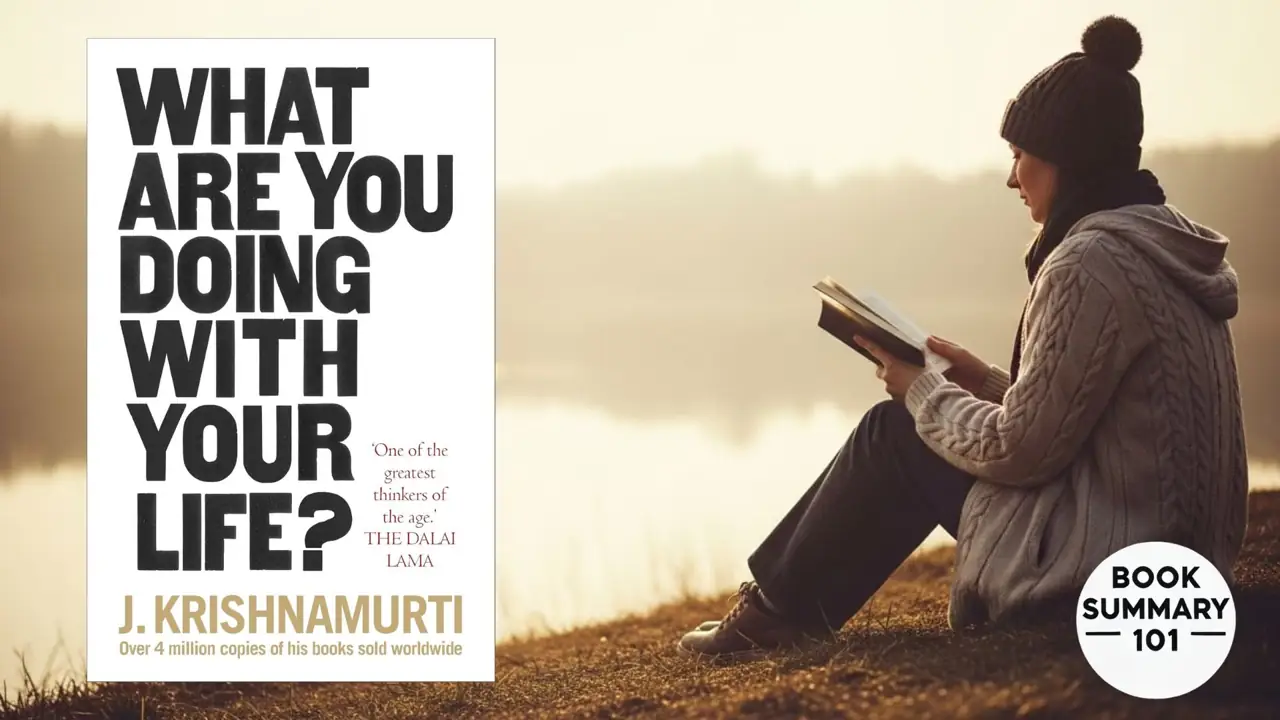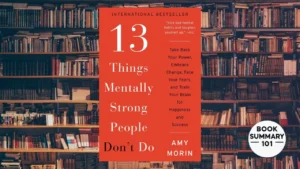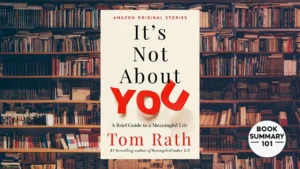Have you ever caught yourself in the middle of a busy day, pausing to ask: What’s the point of all this? Maybe you’ve wondered if your work, relationships, or even the way you spend your free time truly reflect who you are and what you want from life. If so, What Are You Doing With Your Life? by Jiddu Krishnamurti is the book you didn’t know you needed.
In this deeply introspective guide, Krishnamurti doesn’t hand out easy answers. Instead, he invites you to challenge the way you think about success, happiness, and purpose. Let me take you through what makes this book a must-read and how it can shake up the way you see your own life.
Why Read This Book?
Let’s be real: self-help books often serve up cookie-cutter advice. But Krishnamurti’s approach is different. He’s not interested in telling you what to do; he wants to wake you up. This book dives into the heart of questions we all grapple with—like the meaning of life, the traps of societal expectations, and the essence of true freedom.
Here’s what makes What Are You Doing With Your Life? stand out:
- It’s about asking the right questions: Instead of prescribing a roadmap, Krishnamurti empowers you to explore your own path.
- It’s timeless: Written decades ago, the ideas still hit home in today’s chaotic, fast-paced world.
- It’s thought-provoking: Be ready to wrestle with ideas that challenge your beliefs, values, and priorities.
What Krishnamurti Wants You to Know (In-Depth)
The Trap of Comparison
Krishnamurti dives deep into one of the most pervasive issues we face: comparison. Whether it’s comparing your salary, lifestyle, looks, or relationships, this constant measuring of yourself against others leads to endless dissatisfaction. Why? Because no matter how much you achieve, there’s always someone who seems to have more or do better.
But here’s the twist: Krishnamurti doesn’t just blame society or social media (though those are certainly factors). He challenges you to look inward. Why do you compare in the first place? What are you hoping to gain? He suggests that comparison comes from fear—fear of not being good enough or missing out—and the only way to break free is to recognize that fear for what it is.
Practical Takeaway:
Think about a time when you felt good about an accomplishment—getting a promotion, finishing a creative project, or hitting a personal milestone. Now, imagine that same moment, but you find out someone else achieved the same thing faster or better. Did your joy fade? Krishnamurti urges you to stop basing your happiness on external validation and instead, focus on what fulfills you.
Real-life example: Let’s say you’re a writer who just finished a heartfelt blog post. Instead of celebrating your work, you see someone else’s article trending and immediately feel inadequate. Why does their success diminish your own? Krishnamurti would say it’s because your focus is misplaced—redirect it toward the value you created.
Freedom from Conditioning
This idea is at the heart of Krishnamurti’s philosophy. He argues that most of us live according to a script we didn’t write—shaped by our parents, schools, culture, and society. From an early age, we’re told what’s “good” or “bad,” what success looks like, and even what kind of life we should aspire to. But are these beliefs truly ours?
Krishnamurti calls this conditioning, and it’s the invisible cage that keeps us from genuine freedom. He asks you to examine your life deeply: Are you chasing a career because it’s your passion or because it’s what’s expected? Are your relationships authentic, or are they based on roles society has imposed?
Practical Takeaway:
Freedom begins with awareness. Start by questioning one “truth” you’ve always accepted without scrutiny. For example, if you believe that financial success equals happiness, ask yourself: Is this my belief, or was it handed down to me? What truly makes me happy?
Real-life example: Imagine you’ve always felt pressured to pursue a prestigious career, like medicine or law. You excel academically, but deep down, you dream of becoming an artist. Society—and maybe even your family—tells you this is impractical. Krishnamurti encourages you to look beyond this conditioning and ask: Whose life are you living?
Living in the Present
Krishnamurti’s insights on the present moment are profound yet simple: the past is gone, and the future hasn’t arrived. So why do we spend so much of our mental energy dwelling on either? We replay past mistakes, holding onto guilt and regret, or we obsess over future plans, worrying about what might go wrong. Meanwhile, life—the only moment we actually have—is happening right now, and we’re missing it.
Krishnamurti explains that living fully in the present isn’t about ignoring the past or being reckless about the future. It’s about embracing the now with total awareness. When you’re fully present, life becomes richer and more meaningful because you’re no longer distracted by things you can’t control.
Practical Takeaway:
Start small. The next time you’re eating a meal, put away your phone, turn off the TV, and focus solely on the taste, texture, and smell of your food. Notice how different the experience feels. This kind of mindfulness can extend to anything—conversations, walking, or even doing chores.
Real-life example: Have you ever taken a walk in nature but spent the whole time thinking about an argument you had or worrying about a deadline? Instead of enjoying the sound of birds or the feel of the sun on your skin, you’re trapped in your head. Krishnamurti would say this is a missed opportunity to live. Try grounding yourself in the present moment during your next walk and see how it transforms the experience.
True Education is Inner Growth
Krishnamurti’s perspective on education is revolutionary. He argues that our traditional systems of schooling focus too much on external achievements—grades, degrees, and job readiness—while neglecting the most critical aspect of education: understanding ourselves. To Krishnamurti, true education is about cultivating awareness, questioning our beliefs, and growing emotionally and spiritually.
He asks us to redefine success: Is it about acquiring knowledge and skills, or is it about becoming a wise, compassionate, and self-aware human being? By focusing solely on the former, we risk creating individuals who are skilled but disconnected from their inner selves.
Practical Takeaway:
Education doesn’t end in the classroom. Take time for self-reflection. Journal about your fears, desires, and habits. Read books or listen to podcasts that challenge your thinking. View every experience—good or bad—as an opportunity to learn more about yourself.
Real-life example: Think about the last time you faced a failure—maybe you didn’t get a job you wanted, or a relationship ended. Instead of seeing it as a setback, what if you approached it as a lesson? What did it teach you about your values, resilience, or goals? Krishnamurti would say this kind of introspection is the essence of true education.
These ideas are just the tip of the iceberg. Krishnamurti doesn’t offer quick fixes or easy answers, but that’s the point. His philosophy is about encouraging you to ask better questions and take charge of your own growth. Each of these concepts can be life-changing when applied with honesty and courage.
How This Book Can Change You
- The burnt-out professional: You’re crushing it at work, but deep down, you feel empty. Krishnamurti’s insights can help you question whether your definition of success aligns with your values.
- The people-pleaser: If you’ve spent your life trying to meet others’ expectations, this book will nudge you toward a more authentic path.
- The overthinker: Struggling with constant “what-ifs” and “should-haves”? The emphasis on present-moment awareness might just be your antidote.
Why You’ll Love (and Struggle With) This Book
This book isn’t a light read. You won’t find quick-fix solutions or comforting affirmations. But if you’re willing to sit with its challenging questions, it can be transformative. It’s like having a brutally honest friend who pushes you to grow—not always easy, but so worth it.
Join the Conversation!
Have you read What Are You Doing With Your Life? What questions has it raised for you? Or maybe you’re intrigued but hesitant—what’s holding you back? Let’s talk about it in the comments. Your insights and experiences could inspire someone else to take the plunge.
Let’s figure this out together: What are you doing with your life?
5 powerful quotes from What Are You Doing With Your Life? by Jiddu Krishnamurti
📖 “It is no measure of health to be well adjusted to a profoundly sick society.”
Krishnamurti reminds us that just because you “fit in” doesn’t mean you’re thriving. Many of the norms we’re conditioned to accept—endless competition, material obsession, stress as a status symbol—are symptoms of a deeper dysfunction.
This means: Being ‘normal’ in a broken system isn’t a sign of wisdom or well-being. True sanity might mean standing apart and asking the hard questions.
📖 “Freedom is not given to you by another. Freedom is something you take.”
He challenges the idea that someone else—society, parents, institutions—can hand you freedom. Real liberation starts with your own awareness, decisions, and courage to break free from mental and cultural conditioning.
This means: You don’t wait for permission to live authentically. You claim your freedom by thinking for yourself.
📖 “You can only be afraid of what you think you know.”
Fear, according to Krishnamurti, is rooted in assumptions and imagined outcomes. When you observe life without the filters of belief or memory, fear dissolves.
This means: Much of what scares you isn’t real—it’s a story in your head. Letting go of that story brings peace.
📖 “To understand yourself is the beginning of wisdom.”
Instead of chasing external knowledge or approval, Krishnamurti directs your attention inward. The more clearly you see your own fears, desires, and conditioning, the more capable you are of living with clarity and compassion.
This means: Self-awareness is the foundation for everything—growth, peace, and authentic relationships.
📖 “In obedience there is always fear, and fear darkens the mind.”
When you blindly follow rules or authority—whether from parents, teachers, or culture—you stop thinking for yourself. This fear-based obedience keeps you small and confused.
This means: True clarity and creativity come from questioning, not from following blindly.
Let these quotes sit with you. Reread them slowly. They aren’t just wise sayings—they’re invitations to pause, challenge, and maybe even reimagine the way you live.



